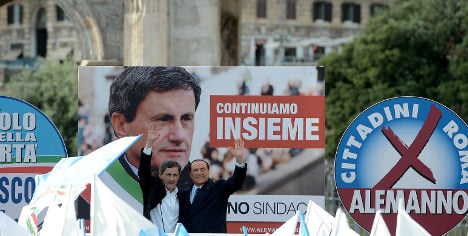The battle in Rome is the highlight of an otherwise lacklustre campaign. Little known on the national scene, challenger Ignazio Marino picked up 43 percent of the vote in the first round two weeks ago, while Alemanno, a former neo-fascist who is now a member of Silvio Berlusconi's centre-right PDL, came in second with 30 percent.
Victory for Marino would be a shot in the arm for the centre-left Democratic Party (PD), which lost ground in this year's inconclusive general elections, while Silvio Berlusconi's centre-right People of Freedom Party (PDL) has fared poorly in previous recent municipal votes.
"I have the full support of the PDL, and Silvio Berlusconi has entered the ring using his preferred means, which is television," Alemanno said after winning the endorsement of the media baron and former prime minister.
"The whole party is working to win this election," he said. "Everyone knows that we can't leave Rome to Mr Marino. The future of the right depends on my victory."
The two-day vote in 67 towns and cities ends at 1300 GMT on Monday, with results expected in the evening.
But turnout is at record lows, reflecting deep voter disenchantment with politicians after the two-month stalemate that followed the February vote.
In Rome, the figure was at just eight percent at noon as the sunshine lured voters to the capital's nearby beaches.
Italian President Georgio Napolitano voiced concern about the state of politics and the fate of the right-left coalition government under Prime Minister Enrico Letta.
"The problem today is to ensure the survival of the government to meet the minimum requirements of stability for the country and its institutions," he told La Repubblica.
Marcello De Vito, the candidate of the Five Star Movement of populist firebrand Beppe Grillo, scored just 12 percent in the first round in Rome despite the anti-establishment party's breakthrough success in the parliamentary elections.
Neither De Vito nor independent candidate Alfio Marchini, who came last in the first round with 9.5 percent, indicated their preferences in the second round.
The first-round vote in 563 towns and cities also saw a record low turnout, while the Five Star Movement failed to secure a single seat.



 Please whitelist us to continue reading.
Please whitelist us to continue reading.
Member comments